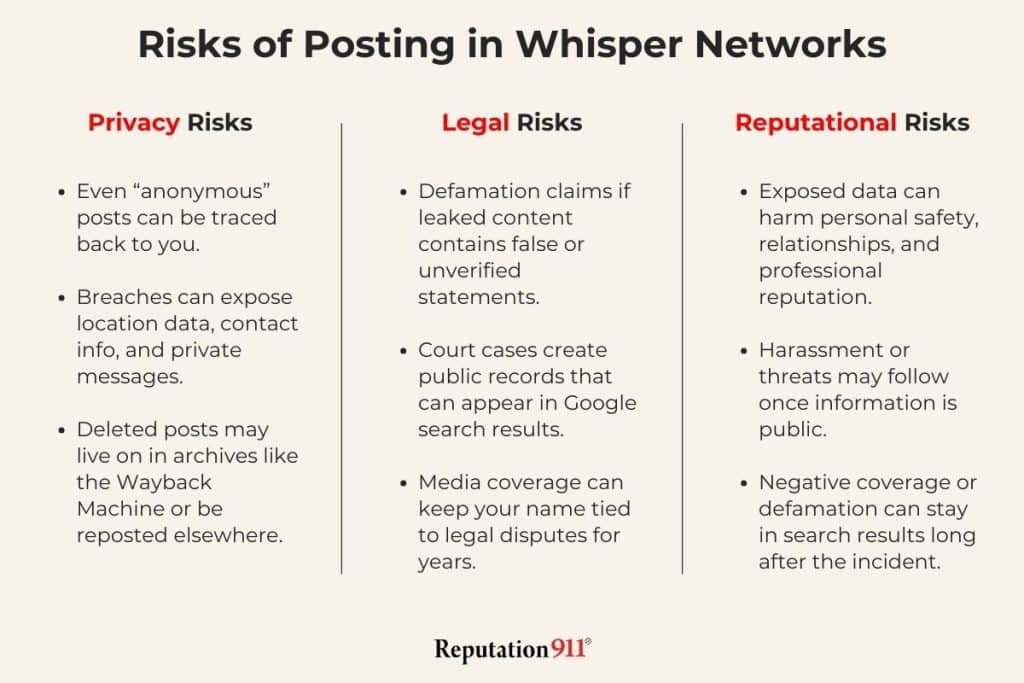The Tea App promised to be a private space for women to share dating experiences, check backgrounds, and warn others about potential red flags. In July 2025, that promise of safety was broken when a massive data breach exposed tens of thousands of images, messages, and personal details.
For many women, the leak has meant harassment, safety concerns, and long-term reputation risks. This breach is a reminder that even “safe” spaces online can fail, and why protecting your privacy and reputation is essential.
The July 2025 Tea App breach exposed the personal data of thousands of women–including IDs, addresses, and private messages–turning a platform meant for safety into a serious privacy and reputation threat. The incident highlights the risks of using “whisper network” apps, from legal exposure to long-term search visibility, and outlines steps to protect personal information, respond to data leaks, and post more safely online.
Tea, officially called Tea Dating Advice, is a women-only mobile app created to help users stay safer while dating. It works as a “whisper network”, aka a space where women can:
To join, users had to verify their identity with a photo or ID, which the company claimed was deleted after authentication. The app gained millions of users and was marketed as “the safest place to spill tea” about potential partners.
In late July 2025, Tea discovered a major data breach affecting users who signed up before February 2024.
Hackers accessed:
Within days, the stolen data appeared on 4chan, spread to X (formerly Twitter), and was reposted on a site called TeaSpill, where users ranked women’s photos. Reports also claim trolls used the metadata to map user locations.
The fallout has been severe. Multiple class-action lawsuits are underway — not just against Tea, but also against platforms accused of hosting or spreading the leaked data. For many women, this means their personal information, and now their legal involvement, is searchable online.
Whisper network apps like the Tea App — and popular Facebook groups such as Are We Dating the Same Guy — are designed to help women protect themselves by sharing information privately. But as the Tea breach shows, these platforms can also carry serious risks.
Even in apps that promise anonymity, posts can often be traced back to you.
When a breach happens, hackers can expose:
Even if you delete a post, it may still exist in online archives like the Wayback Machine or on other sites where it was shared without your consent.
Posting in a whisper network may feel safe, but if your content becomes public, it can lead to legal consequences.
For women posting in whisper networks, a data breach can cause long-lasting harm. When private data (including names, photos, and personal conversations) is exposed, it can affect:
Media coverage of the breach, and any lawsuits that follow, can keep these stories visible in search results for years, long after the original post is gone.

Take screenshots and keep records of where your data appears online. This includes social media, forums, and any websites hosting your information.
Contact site owners or platform moderators to request removal of your images or posts. For persistent content, work with professionals who can remove news articles from Google and other search engines.
Publicly available data can make you an easy target for harassment or scams. Learn how to remove your personal information from Google to reduce exposure.
Data leaks can resurface months or years later. Regularly search for your name and images, set up Google Alerts, and keep your accounts secure with strong passwords and two-factor authentication. Consider professional monitoring to detect new threats before they spread.
If the leak leads to threats or intimidation, follow the same steps used to get rid of blackmailers — secure evidence, limit engagement, and take action quickly.
If you believe the leak could lead to a defamation claim or other legal action, consult with an experienced defamation attorney to discuss your options.
If you choose to use whisper network apps or online groups, take steps to protect yourself before you hit “post.”
For more strategies to safeguard your personal information, see our guide on how to protect your online privacy.
If your information was exposed in the Tea App breach or a similar incident, our team can help you take back control of your online presence. We work with clients to:
Our goal is to restore your privacy, repair your reputation, and give you peace of mind.
The Tea App breach is a clear reminder that even platforms built for safety are not immune to privacy failures. Once your personal information is online, it can spread quickly. The impact on your safety, relationships, and reputation can last for years, even if the original post is deleted or the app shuts down.
Key takeaways:
Don’t wait for a breach or lawsuit to take control of your online presence. Contact Reputation911 today for a confidential consultation and learn how we can help protect your privacy and rebuild your reputation.
If your personal information was leaked in the Tea App or another data leak, we can help. Our privacy management services remove exposed data, suppress and remove harmful search results, and protect your online reputation.